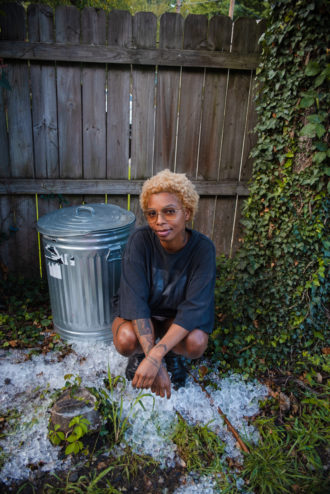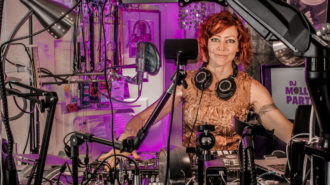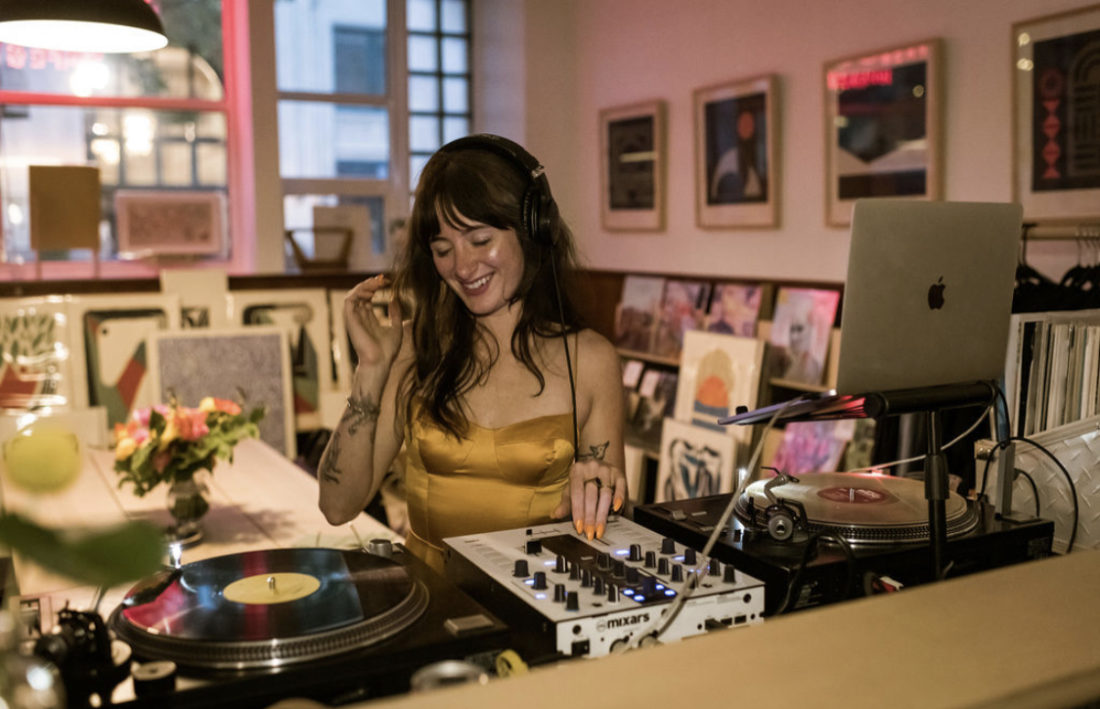Molly Kummerle didn’t set out to be a DJ. But the more she reflects on her journey to becoming DJ Molly Parti, the more it feels like destiny.
While fronting the Asheville-based trip-hop band Paper Tiger in 2010, the frequent need for an opening act prompted her to learn the trade. And as word got out that she was DJing, offers to perform started stacking up. At that time, she notes, there were not a lot of local female DJs, outside of herself and Candice B. But even without many female role models, Kummerle felt inspired by the new and creative ways to explore music that singing and playing traditional instruments didn’t offer.
“It felt like I could bring together all of my background and influences as a kid growing up in St. Croix with steel drums and calypso to the kid [I became] living in Western North Carolina playing trombone in marching band [to] the 20-something who discovered acid jazz, along with my love for Motown, soul music, hip-hop and funk,” she says. “As a DJ, all of this finally made sense. I’m still fascinated and inspired by mixing genres in unexpected ways and also by turning people on to new music.”
And local fans have responded. A year after she turned the art form into a full-time career, Kummerle earned second-place for “DJ (Nonradio)” in the 2023 Best of WNC readers’ poll — her first time placing in the category. Despite this recognition and success, Kummerle says she still deals with everything from sexist pay scales to people doubting her technical skills.
“I’ll show up [at a gig] with my Rock N Roller cart and all my stuff, and people will be like, ‘Oh, are you going to set that all up by yourself?’ And I’m like, ‘No, I have a gnome that follows me around and does it for me,’” she says. “I don’t know if they do that because I’m a woman but I’m like, ‘Uh, yeah.’”
While these outdated politics subsist, a supportive professional community in Asheville and lowered barriers to entry via technological advances have helped grow the number of local women in the field. And though Kummerle says those statistics could and should be higher, when a given show’s set builds to peak energy and the crowd responds in kind, more than one victory has occurred.
Starting the party
Though Kummerle’s mostly self-taught, she says local male DJs Marley Carroll and Oso Rey were inclusive and helpful as she found her footing. And within a few years, the number of female colleagues began to increase.
Annelise Kopp, aka DJ Lil Meow Meow, stepped onto the scene with a number of one-off gigs in the early 2010s. Then in 2015, she and DJ Rachel Thorn began co-hosting Cherry Bomb, a monthly lesbian dance party at The Underground behind O. Henry’s. While that residency has since ceased, Kopp currently hosts a monthly themed dance party at Little Jumbo and performs at numerous other local venues.
“I’ve been accumulating records and dreaming up mixes and sets for as long as I can remember, but having a monthly late night [gig] really felt like the turning point — and also when the name Meow Meow was born,” says Kopp, who finished first in this year’s Best of WNC poll for the second consecutive year. “I was lucky that it was such a fun and supportive crowd.”
In 2016, a year after Cherry Bomb launched, Honey Simone, aka DJ Honey, began dabbling in the craft. At the time, her then-boyfriend was a DJ in town. Her two uncles had also been Black queer DJs in Chicago and New York City in the ’80s. She says what ultimately propelled her forward was a desire to see more women in the scene.
Simone quickly found support and guidance from Kopp and was also mentored by DJs Mesy and Zoti, who helped Simone get some of her first gigs. She feels that Asheville’s scene is easier to navigate than most because it’s not oversaturated and is more welcoming, unlike other cities she’s played — including Nashville, Tenn., which she describes as “still very much a boys club.”
She believes her fearless personality has also helped. “I have never been intimidated about walking into a room, mostly because I am a Black queer female DJ,” Simone says. “There are so many other obstacles that I face on the daily, so trying to get a gig wasn’t as scary to me. And I also understand the reality of you’re not going to get everything you ask for, but that doesn’t stop you from moving forward.”
The record skips
While the number of Asheville-area females have steadily grown, challenges nevertheless persist. Simone notes that the pay gap between sexes extends across all industries, including music. But she says she’s gotten better over the years at asking for rates that she deserves.
Kummerle notes similar experiences. When she recently turned down an event she’d previously played at, the venue offered the gig to a male colleague. The two later discussed their rates, and she discovered his pay far exceeded what she’d earned. “He mentioned that he hadn’t really thought about the pay inequality until then,” she says.
Kummerle believes that women in her industry experience this and other challenges due to an underlying lack of respect for female intelligence as professionals.

“I think people don’t expect women to be good businesspeople,” Kummerle says. “They think I don’t know what I’m doing or I’m not going to have a contract or we’re just going do this as friends. And I’m like, ‘No, we’re gonna go through the whole process because this is a business.’”
Simone has faced similar issues and notes many other female DJs in town do, too. They all work hard on their craft, Simone says, preparing carefully curated sets days before a show. But that effort and intention can be lost on attendees because of the DJ’s sex, resulting in disparaging actions.
“Sometimes people will come up before you can get 30 minutes in your sets, making a request,” Simone says. “I know you wouldn’t do this if I was a guy. I’m playing a set — I am the DJ that got hired to play a set at this club.”
Kummerle echoes Simone’s frustration, noting moments where “people walk in and come straight to you wanting to change what you’re doing before they even know what you’re doing.”
She adds that it’s always polite to ask if a DJ is taking requests before making one. Tipping is also good form. But even at private parties or weddings, where she takes advance and in-person requests, she still has to use her professional judgment on when to play a request or whether it’s appropriate for the event.
“Music is a powerful tool, and as DJs we are responsible for taking people on a smooth journey. So sometimes I don’t play a request right away because it would be too abrupt to go in a straight line,” Kummerle explains. “I say, ‘Trust the DJ’ — there’s a reason they got hired.”
Even getting a decent gig, however, remains elusive for many women in the industry. Kopp stresses that any conversation about the challenges women face must acknowledge the experiences of nonbinary and trans DJs in the industry.
“There are a lot of precedents set regarding who has access, what they are allowed to play and how entitled crowds act,” Kopp says. “Gatekeeping, unsolicited feedback, objectification — these are things we’re all up against.”
The key to overcoming these challenges, she adds, is working with venues and bars with supportive and forward-thinking staff and trying to cultivate different types of spaces. She feels fortunate to work with “really wonderful people in this town” — and that includes Simone’s Different Wrld, which has become a haven for the LGBTQ+ community.
But despite the growing number of ally venues, the late office hours that DJs keep bring its own potential concerns with crime as artists lug gear back to their vehicles, often after nearly everyone has left the club. While Kummerle and Simone rarely perform deep into the night, they acknowledge the increased risks of assault and theft at night. And while Kopp is no stranger to coming home at 2 a.m. after multiple sets a week, she credits strength in numbers and says those same responsible venue owners buoy her confidence in operating late into the night.
“I try to stay aware of my surroundings like anyone else, but I’ve never felt unsafe, and that’s largely because of the amazing community around me,” Kopp says. “We look out for each other.”
Distinct mix
The type of support Kopp spotlights is also at play in encouraging other local women DJs to join and grow the scene. Kopp notes that the prevalence of and access to digital DJing has lowered some of the barriers to entry that historically kept DJing somewhat of an elitist pursuit. And while starting out can still prove cost-prohibitive, there are far more entry points into the field.
“I think it’s important to get instruments and tools into new hands — I mean, that’s the CliffsNotes story of how techno was born in Detroit,” she says. “Also, I think there is simply excitement around hearing music from different perspectives in a scene that has been overcrowded by white men.”

While Kummerle stays busy as an event DJ, she’s also found success on the livestream platform Twitch. The online performances diversify her income stream but also provide artistic freedom and interaction with another diverse community.
“There’s something about the platform that really leads to collaboration,” Kummerle says. “I’ve had a lot of people help me with technology because it’s a lot to learn. And I’ve in turn helped a lot of other people.”
Kummerle also feels that the number of women who feel inspired to try DJing after seeing other women doing it has greatly contributed to the growing numbers. And Simone adds that people’s desire to see others who look like them behind the boards has helped boost minority DJ numbers and that the simple need for people to release pain and trauma through movement has elevated figures overall.
“With all the tensions that we’ve experienced, especially in the past couple years, I see so much more dancing,” Simone says. “It’s a known thing — anywhere in the world that’s going through political and cultural stress, the dancing is going to explode.”
Collective crate-digging
All three women are also committed to sustaining momentum by sharing their knowledge with other female DJs. Though mentorship so far remains informal, they’re available to answer questions and far prefer collaboration over competition.
“There are so many different kinds of DJs doing so many different things that even if we all have the same tracks — which we do — we’re not going to spin them the same,” Kummerle says. “We’re not going to put them with the same other track. It’s still such a creative profession to be in.”
As such, she, Kopp and Simone encourage young and upcoming female DJs to be true to themselves as well as their musical interests and unique visions. They also remind fledgling DJs to remember that their individual style won’t be — and shouldn’t be — for everyone. But if they stay true to themselves as well as their musical interests, they will find their audience.
“Go for it,” Kopp says. “If you are a woman, trans, nonbinary or otherwise marginalized by the music industry, definitely do it. I think there are a lot of people out here, including myself, who would be excited to support you.”
Kummerle adds that it’s important for aspiring women in the industry to set boundaries and establish their value. She notes that it took hiring a business coach for her to turn that corner. But doing so was a game-changer.
“Knowing your worth and just asking for it and then not apologizing for it — that kind of attitude is looked at as more male,” Kummerle says. “Navigating in a space of confidence makes it a lot less stressful. But it’s a business, and if you’re going into it with that in mind, it makes boundaries a lot better to have and a lot clearer.”
For Simone, much of her worth within the industry stems from the connection she feels as a Black person to the history of DJing. She’s emboldened by parallels she sees between downtrodden individuals in early ’80s New York City and her Asheville contemporaries finding solace and release through dancing. Grooving to a DJ’s work, she says, has the power to save folks.
“Seeing people sweating and dancing collectively — it doesn’t matter who you are, everyone’s just in that room to dance,” Simone says. “I think that is some of the most powerful ways of revolution. It was revolutionary then, it continues to be revolutionary now, and I’m going do my part whenever I can to keep that going.”




Before you comment
The comments section is here to provide a platform for civil dialogue on the issues we face together as a local community. Xpress is committed to offering this platform for all voices, but when the tone of the discussion gets nasty or strays off topic, we believe many people choose not to participate. Xpress editors are determined to moderate comments to ensure a constructive interchange is maintained. All comments judged not to be in keeping with the spirit of civil discourse will be removed and repeat violators will be banned. See here for our terms of service. Thank you for being part of this effort to promote respectful discussion.